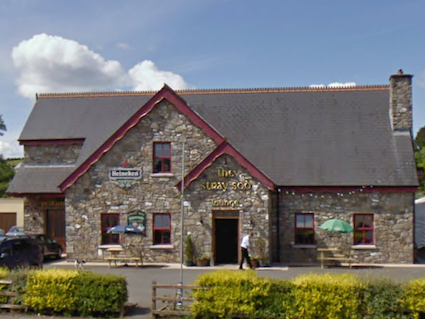While we’re speaking of street suffixes — we were just speaking of street suffixes, weren’t we — and after the stravenue encounter, 12MC stumbled upon a suffix of even more weirdness: Drung. Imagine, living not on a street, an avenue, a boulevard, a drive or even a terrace, rather a drung.
Drung used in this manner is extremely rare and applies to only one place I could find, to Newfoundland. I’ve encountered the unique words that Newfoundlanders brought to English previously, for example the use of “tickle” to describe a narrow saltwater straight or a settlement abutting one. The same source that defined tickle, the ever-helpful Dictionary of Newfoundland English, also solved the mystery of drung. It was a “narrow lane or passage between houses, fenced gardens, etc.” It derived from the Old English “thrang,” which referred to a throng or a crowd. Variations of the term included drang and drong. So I guess that would make a drung the tickle of roads.
I found very few instances of drung used as a street suffix, making it perhaps even more rare than stravenue. However, I discovered two very small clusters. I imagine there are probably additional examples out there and likely I would have found them with access to a database of Canadian street names. Drung was too close to Drunk or Drug, which seemed to confuse the search engines. No, I really did mean drung. They thought they knew better though, like I was drung [sic.] or something and too impaired to type the word correctly.
Carbonear
Cotter’s Drung to Tyre’s Drung, Carbonear, NL Canada
The first mini-cluster occurred in Carbonear, with the appearance of Cotter’s Drung and Tyre’s Drung.
Carbonear is “among the oldest settlements in North America” according to the town history. The history further explained that Carbonear had a name even before it had people, and applied to the area even before the establishment of the Cupids Colony, the oldest English settlement in Canada. The name came courtesy of migratory fishermen taking seasonal voyages to the nearby Grand Banks.
“The name Carbonear may be French or Spanish. Some people think that the name comes from a Spanish word, “carbonera”, which can mean either ‘wood prepared for burning into charcoal’, ‘charcoal kiln’, or ‘woman who makes or sells charcoal’. If Carbonear is a French name, it might come from the French word ‘Carbonnier’, which is a family name from Picardy and Normandy in France. It might also come from ‘La Carbonnière’, which is a place-name in Normandy…”
Portugal Cove-St. Philip’s
Alfred’s Drung to Solomon’s Drung, Portugal Cove-St. Philip’s, NL Canada
The second mini-cluster occurred in Portugal Cove-St. Philip’s, with the appearance of Alfred’s Drung and Solomon’s Drung.
Portugal Cove-St. Philip’s is a new construct, an amalgamated town formed recently in 1992. However the piece-parts are old, and Portugal Cove in particular is extremely old. The town contends,
“Portuguese fishermen were said to have first visited the area of Portugal Cove-St. Philip’s in 1500, when Gasper Corte Real landed in Portugal Cove to bury two of his men that had died during the voyage from Lisbon. It is also believed that fishermen settled around the same time, as they used the cove to land and dry fish.”
Thus, Carbonear and Portugal Cove-St. Philip’s have a couple of things in common: they both occupy the Avalon Peninsula and they both trace back to the earliest days of European exploration and settlement in Newfoundland. It made sense that an old Newfoundland English word would pass through the generations and into the modern age in both locations.
I found other instances of drung albeit not as a suffix (e.g., Drung Road, Rocky Drung Road). I suspect that drung might be used in this more generic manner more often than as a specific suffix.
Other Uses of Drung

I discovered other instances of drung — completely unrelated to the Newfoundlandish usage of course — as I combed through online search engines. Is Newfoundlandish even a word? Regardless, Drung is a civil parish in County Cavan, Ireland. I found nothing about the etymology of Drung in this context and learned nothing else about the civil parish, other than it appeared on a map and it seemed to have a nice pub.
Another Drung appeared in China.
Dulong River Basin
The Drung people (or Derung or Dulong) are one of China’s 56 officially recognized ethnic groups. They are also one of the smallest. They are very difficult to encounter, located in an extremely rugged, mountainous area near the border with Burma/Myanmar: “More than 6,000 members of the Derung nationality live in some of the most isolated terrain in all of China. Ninety percent of the Derung live in the extreme northwestern part of Yunnan Province, along the Dulong River basin in Gongshan County.” I had quite a difficult time trying to locate the Dulong River Valley. I can’t say I found the exact spot inhabited by the Drung, however, the map should be pretty close.
Well, I never would have imagined a single word, drung, could mean a narrow lane in Newfoundland, a civil parish in Ireland and an ethnic group in China. I think this demonstrated only that there are a finite number of easily pronounceable single-syllable words to go around. Coincidental repetitions are to be expected, and sometimes with surprising results.

Leave a Reply